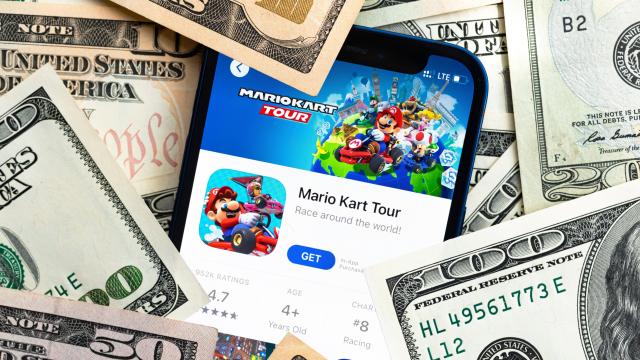An under-18 gamer, with support from a guardian, is suing Nintendo over the company’s in-game loot boxes that charged players real money for a slim chance at pretend advantage. The class action lawsuit was originally filed last month, but escalated to the federal system through California State Court last Wednesday, according to a report from Axios.
The suit claims that Nintendo engaged in deceptive and illegal practices through the in-game transactions it sold to players of the popular mobile racing game, Mario Kart Tour. By enticing players to pay actual money for chance-based video game rewards, the plaintiffs allege the company did something “immoral, unethical, oppressive, unscrupulous, and/or substantially injurious to consumers.” Moreover, Nintendo’s actions were allegedly in violation of Washington state’s Consumer Protection Act, per the suit.
For years, Mario Kart Tour — a freemium offering popular among young gamers — employed an entirely luck-based system to entice users to roll the proverbial dice on in-game boosts. Pulling on a green “Spotlight Pipe”, known colloquially as a “gacha pipe,” would release new gliders, karts, or characters at random that could significantly improve a player’s in-game performance. Each “pull” cost five “Rubies” (about $3 USD ($4)). Such loot box features are often derided as predatory and companies have been widely criticised for them, especially in games that are marketed towards kids.
Nintendo discontinued the gacha pipe in October 2022, replacing the mechanism with a more straightforward, less gamble-y (though still paid) in-game store. Other gaming companies have also similarly dropped loot boxes in recent months.
But before the Nintendo pipes were cut off, between 2021 and 2022, the new lawsuit states that the lead plaintiff — again, a minor — charged more than $US170 ($236) on his dad’s credit card without permission through these Mario Kart Tour loot boxes. There are well-documented cases of players racking up much higher bills in comparable game set-ups, but still the player (and his dad) are probably right to be pissed off. Through Mario Kart Tour, Nintendo yielded an estimated $US293 ($407) million between 2019 and 2022 — according to a report from Games Industry.biz.
“Plaintiff almost never received any valuable reward from the Spotlight Pipes he had purchased during his time playing Mario Kart Tour and would not have made the amount of in-game purchases that he did had he known the true odds of his being able to obtain any reward from the Spotlight Pipe, or that he would not be allotted a refund,” noted the legal filing. Gizmodo reached out to Nintendo for comment, but did not receive a response as of publication time.
This is not the fist lawsuit filed against a video game company for sketchy in-game purchase systems. Google, Apple, Valve Corp., and others have all faced legal complaints for the promotion and creation of games that included microtransaction systems essentially indistinguishable from gambling. However in each of these cases so far, the tech companies have come out on top, according to an analysis from JD Supra. One lawsuit against Electronic Arts (EA games) claiming that loot boxes amounted to “unlawful gambling” was tossed out of court by a Canadian judge last month.
Gaming companies have also faced scrutiny and watchdog investigations worldwide for their loot box practices. In one notable win in the fight against manipulative in-game purchases, Epic Games — the maker of Fortnite — was forced to pay hundreds of millions of dollars in fines, in part because of its methods of coercing young users to spend money.
